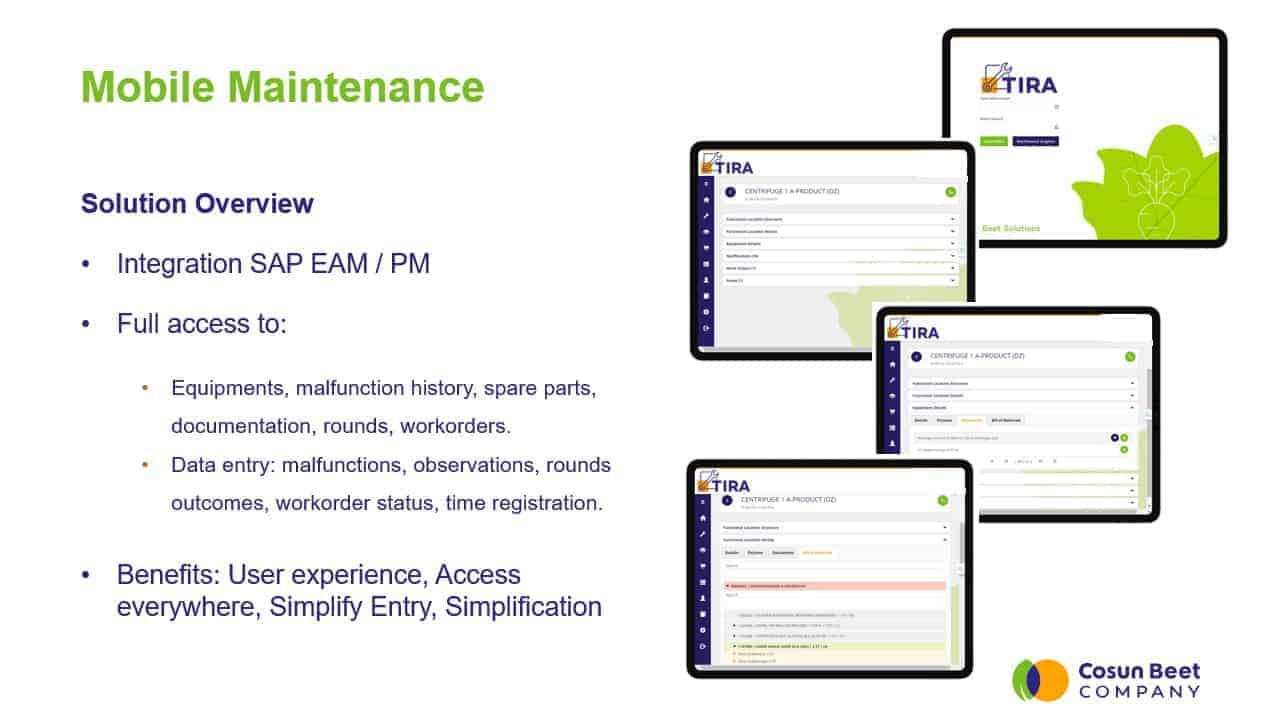Cosun Beet Company Powers Digitalization and SAP Innovation
Cosun Beet Company (CBC) is one of the most efficient sugar producers in Europe, providing food, energy, and biowaste products across the region. CBC’s ambition is to be the greenest and most innovative sugar beet producer in the world, which they aim to accomplish through reducing the use of fossil fuels and maximizing their beet yields.
Wim Hummel, ICT Manager at CBC, joined Mendix World 2021 to discuss how the Mendix platform enabled CBC to use an Agile approach to transform their software portfolio and drive SAP innovation during a challenging time.

Simplification Before Transition
CBC has been an SAP customer since 1989. With an SAP migration approaching in 2030 at the latest, the organization was faced with several questions they needed to answer.
The effort involved in migrating to a new ERP is not unique to CBC. Contained in legacy ERP systems are decades of customizations, reflecting an enterprise’s differentiated processes and capabilities.
To migrate to a new ERP, each of those customizations has to be re-created in the target ERP, requiring significant time, resource, and expertise. Reflecting the difficulty of the migration task ahead, just 16% of SAP customers have migrated to S/4HANA.

Despite their processes having low-to-medium complexity, CBC has created approximately 600 custom programs and components with SAP across two domains:
- Agriculture (supporting harvesting and processing)
- Maintenance (supporting the growing season)
Those builds and maintenance took up about 40 person-years of effort over the past 20 years. In advance of the migration, they were interested in both simplifying their processes and finding places where they could innovate. Hummel said about CBC’s priorities, “we innovate and simplify where it matters most to us, namely the tailor-made solutions.”
CBC settled on an agile-based development workflow that would allow them to develop, prototype, and test quickly. As part of that testing, CBC conferred with internal IT staff and SAP consultants on if a low-code solution would be able to help develop end-user solutions that CBC was looking for.
As Hummel exclaimed, “all the answers were positive.” CBC’s core developers predicted that working with low-code would be five times faster than building SAP user interfaces.
Delighting Users with Low-code Solutions
Since beginning the project in March 2019, the CBC team has chosen to begin externalizing these ERP customizations, building them with Mendix to both significantly simplify a future migration, and to deliver high, immediate business value to their end users.
AGRIS (Agricultural Information System) is a solution used by CBC for functions such as planning, contracting, ordering, and payments.
Originally built on SAP, the team created a new solution in Mendix that connects to SAP to send and receive data in real time. This single solution replaced many of CBC’s 600 custom SAP programs and provided a “jumpboard for future innovation,” as forthcoming versions of AGRIS will aim to build in access for CBC’s various stakeholders.

TIRA is another new solution, built to streamline plant and part maintenance. TIRA integrates with SAP Enterprise Asset Management and Project Management to allow CBC staff to check on the current status of equipment, spare parts, and work orders.
Staff can also log malfunctions and observations directly into the application from anywhere, including mobile devices. TIRA replaced another batch of custom SAP shell programs.
CBC has also developed solutions around crop and storage advisory for their growers. By combining data collected from staff in the field, open-source solutions, and a network of 600 IoT sensors, these applications give growers personalized, localized advice.
Hummel explained, “it helps us to reduce the number of herbicides that we have to use in order to keep our plants healthy while at the same time maintaining and even increasing the yields.” The resulting drop in herbicide use and decay within harvested stacks have advanced CBC’s ambition to keep yields growing while maintaining as green a process as possible.

CBC also used the Mendix platform to save 600 workdays per year with a newly-built Dock Planner. The solution acts as a conduit for both CBC staff and external vendors and partners to book time slots at CBC docks. Hummel relayed that this “really helps us in reducing the waiting time at the docks, and also helps us in digital communication and data exchange.”
Better End-user Solutions Leading to Improved Practices
With the deployment of these solutions, CBC has improved the user experience for internal and external stakeholders. Hummel exclaimed, “in the end, we’ve delighted our users.” As part of this success, CBC’s Mendix development team has doubled in the last two years, which will allow them to further explore what innovations are possible.
For Hummel and the rest of the CBC team, working with Mendix greatly enhanced the speed and collaboration of the development process. Because developers created prototypes and were able to gather stakeholder feedback quickly, the team received incredibly useful feedback from end-users, bringing, as Hummel said, “the fun back into creation.”
CBC’s efforts with Mendix have, to date, consolidated 250 of their 600 custom SAP solutions.
In addition, they have been able to reduce pesticide usage and waste within their beet growing operation. They have also created a more efficient operation on their docks, improved and protected crop yields by €1.8 million annually, and come up with easier to use, more scalable technology solutions across the organization.
After two-plus years of working in low-code, CBC’s developers revisited their original prediction that low-code would allow them to develop five times faster. What they discovered was an even more eye-opening number. They estimate that, by staying with SAP user interfaces, they could have accomplished just 15% of what they’ve been able to do with Mendix.
For CBC, experimentation and feedback led to great finished products. Hummel recommended organizations facing a similar situation to CBC take an inquisitive approach: